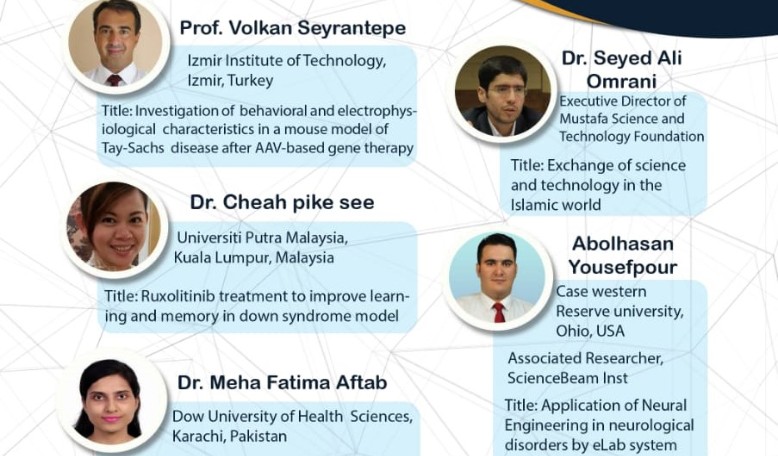Equipment grant winners announced
The winners of ScienceBeam equipment grant were introduced in the virtual closing ceremony of Innovation Lab on Neuroscience and Electrophysiology.
MSTF Media reports:
The Mustafa
Science and Technology Foundation (MSTF) held the closing ceremony of Innovation Lab on Neuroscience and Electrophysiology virtually on September 11, 2021, with the presence of scientists and participants from different countries including Malaysia, India, Iran, Pakistan, and Nigeria.
Among the notable participants were Manzoor Hussain Soomro, Founder President of ECO Science Foundation (ECOSF), and Muhammad Iqbal Choudhary, Coordinator General COMSTECH and Director of International Center for Chemical and Biological Sciences (ICCBS).
Aiming to develop neuroscience and electrophysiology research in the Islamic world, the MSTF in collaboration with ScienceBeam Institute organized a series of Innovation Lab webinars on neuroscience and electrophysiology earlier. In order to support neuroscience and electrophysiology research in three areas, 40,000 EUR equipment grants were to be offered to the best research proposals.
Many research proposals were received from researchers from different countries around the world. After the evaluation of research proposals by the scientific committee, 3 winners were selected eventually.
Executive director of the MSTF, Seyed Ali Omrani, delivered a speech on “Exchange of Science and Technology in the Islamic World” at the beginning of the event.
He talked about different programs developed by the MSTF which make possible the exchange of science and technology in the Islamic world at different levels.
Omrani emphasized the integral role of innovation is “discovering new opportunities,” adding that “innovation has always been one of the most important foundations for the formation of science and technology collaboration.”
Innovation can “provide new methods in science and technology development” and result in better products and services, he continued.
Innovation Labs are units that employ new and agile methods to devise novel ideas that can evolve the overall company, Omrani explained.
He said that the first program of Innovation Lab on Neuroscience and Electrophysiology was held simultaneously with the 5th Science and Technology Exchange Program (STEP) in 2019 at International Center for Chemical and Biological Sciences (ICCBS), Pakistan, adding that he is pleased the closing ceremony of second program of Innovation Lab is to be held today.
Next, the equipment grant winners were invited to talk about their research proposals and research plans.
Volkan Seyrantepe from department of Molecular Biology and Genetics at Izmir Institute of Technology, Turkey, was a winner of full ScienceBeam equipment grant on eLab system. He gave a presentation on his research proposal titled “Investigation of behavioral and electrophysiological characteristics in a mouse model of Tay-Sachs disease after AAV-based gene therapy.”
The second grant winner was Pike See Cheah from department of Human Anatomy at Universiti Putra Malaysia, who won the 60% ScienceBeam equipment grant on her research proposal “Ruxolitinib treatment to improve learning and memory.”
Meha Fatima Aftab from Dow University of Health Sciences, Pakistan, was the third winner who won the 50% ScienceBeam equipment grant. Her research proposal was titled “Role of QEEG in Spiritual Science Research” on which she gave a presentation during the closing ceremony.
After the introduction of 3 winners, Iranian Research Associate of ScienceBeam Institute, Abolhasan Yousefpour from Case Western Reserve University, Ohio, USA, gave a lecture on “Application of neural engineering for management of neurological disorders” as the last speaker of the virtual event.
ScienceBeam Institute has established more than 1000 electrophysiology labs around the world so far. Having developed a great network of neuroscientists, electrophysiologists, and neuropsychologists around the world, ScienceBeam Institute has held more than 200 workshops in France, the US, the Philippines, Morocco, Russia, Lebanon, Georgia, Pakistan, Oman, UAE, and China.

